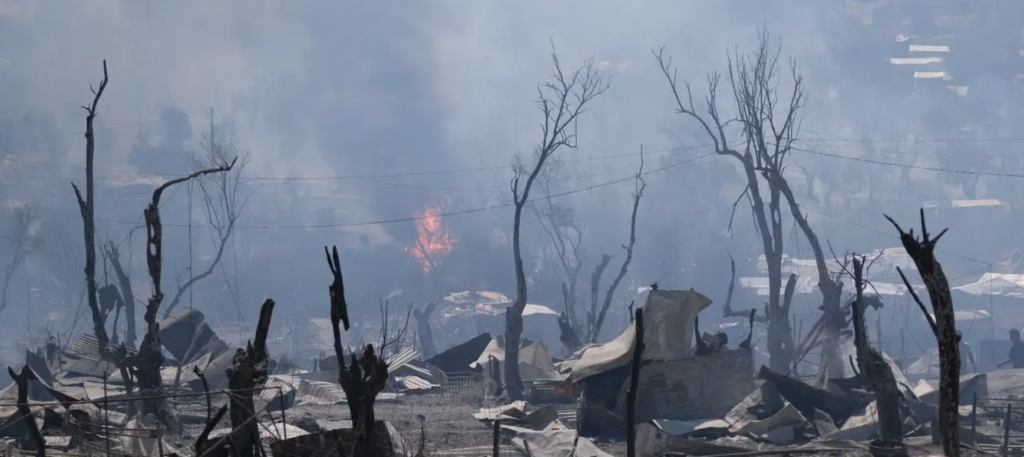In a trial that did not uphold legal standards, four Afghan teenagers were each sentenced to 10 years in prison for the fires that destroyed the infamous Moria camp in September 2020.
A Greek court on the island of Chios charged the four young men with: arson; endangering human life; and the destruction of property. According to Greek authorities, the four started the fire as a violent act of protest after COVID-19 restrictions had been imposed on the camp last fall. However, there seems to be no sufficient evidence to support this claim.
Besides the evidence being questionable, the Greek court had also rejected the plea of defence lawyers to process the cases at a juvenile court, despite the fact that all four accused were minors at the time of the fires and their arrests. Moreover, no press was allowed to follow the trial in the courtroom. The official excuse for this breach of procedural due process were COVID-19 restriction – a laughable excuse in a country that just declared it unobjectionable for 300 people to attend events such as weddings.
No press was allowed to follow the trial in the courtroom.
The implementation of this trial has violated several rights laid down in the Universal Declaration of Human Rights, among them Article 7: “All are equal before the law and are entitled without any discrimination to equal protection of the law” and Article 10: “Everyone is entitled in full equality to a fair and public hearing by an independent and impartial tribunal.” The hearing was neither public nor fair, nor does it seem like the tribunal was impartial. Article 11 of the Universal Declaration of Human Rights states: “Everyone charged with a penal offence has the right to be presumed innocent until proved guilty according to law in a public trial at which he has had all the guarantees necessary for his defence.” As stressed by the defense lawyers, the evidence presented in the trial was not sufficient to sentence the four young men.
The sentences also beg the question who else will be held accountable for the events in Moria. The Greek state and the European Union accepted the fact that more than 12,000 people were forced to live in Moria by the time the fires broke out – four times more than the camp’s official capacity. It is telling that the only ones punished for the shameful situation and end of the first Moria camp – an unsafe facility that did not uphold basic fire safety, hygiene standards or conditions for human dignity – are four teenagers.
The nature of this trial is absolutely unacceptable and contributes to a further loss of credibility in the government’s competence – or will – to uphold the values and laws of democracy.
In order for the sentence of a court to be respected, a fair, non-discriminatory trial upholding people’s rights and a sentence based on evidence are paramount. It is of utmost importance that the legislative, judiciary and executive powers of a country do uphold legal standards and people’s rights – otherwise the trust in a government will decay.
Unfortunately, to anybody who has been following the latest national developments, the violation of Human Rights in a Greek courtroom does not come as a surprise. Greece has developed into Europe’s hangman, implementing the illegal practices that “protect” the European borders. Nonetheless, the nature of this trial is absolutely unacceptable and contributes to a further loss of credibility in the government’s competence – or will – to uphold the values and laws of democracy.

